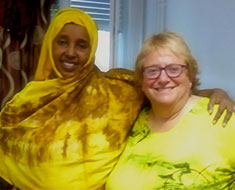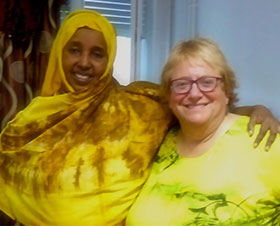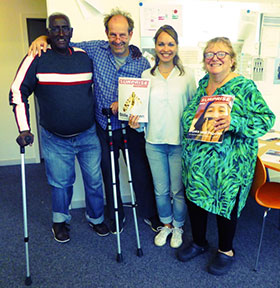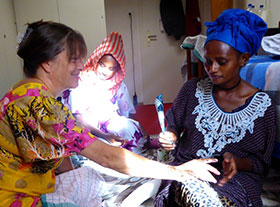Visiting Dr. Nur


Photo by Sally Fowler
Meeting for the first time in person in September, Miriam Jama Siyad and Dr. Ronnie Schenkein treat one another as dear friends. Miriam is the wife of Dr. Mohamed Ali Nur, a veterinarian whom Schenkein befriended through email and traditional mail.
Editor’s note: Thirteen months ago, the VIN News Service published an account of a veterinarian trying to rebuild his life in Switzerland after fleeing civil unrest in his homeland, Somalia, where he was maimed and nearly killed. The story of Dr. Mohamed Ali Nur inspired offers of help from members of the Veterinary Information Network, an online community for the profession. The VIN Foundation began fund-raising to help provide Dr. Nur with a better prosthetic leg. VIN member Dr. Ronnie Schenkein particularly was moved by Dr. Nur’s plight. In addition to donating to the fund, she struck up a correspondence with the family and sent numerous care packages. In September, she met her new friends in person for the first time.
“You pay a man one male camel to transport vaccines and medicine in coolers, to go where there are no roads, across desert and grasslands, to remote outposts where the nomads know they could go to get vaccines and medicines for their animals.”
This is how Dr. Mohamed Ali Nur describes some of the work he did as a veterinarian for 30 years, first for the government of Somalia, and later for the nonprofit organization Vétérinaires Sans Frontières Suisse. His career was brutally interrupted when terrorists in Somalia began systematically assassinating anyone with an education: doctors, nurses, lawyers, professors, teachers and veterinarians. Nur survived a grenade attack by al-Shabaab and found asylum in Switzerland in 2012. He tells me that he knows of 200 animal health-care workers who are not able to do what they were trained to do because they are afraid of being killed.
I have been in correspondence with Nur since October 2015. It happened that I was traveling to Europe in September to speak at a conference at Oxford University on the human-animal bond, so I asked if I might visit him and his family in their adopted home of Basel. My long-time friend and colleague Dr. Sally Fowler accompanied me. We arrived on Sept. 26.
Nur was at the airport to meet us wearing a cap I had sent that reads “Potter County, Pennsylvania.” A Somali friend of his who has been in Switzerland for 20 years and has a good job and a car drove us to Nur’s place. In their early days in Basel, Nur, his wife Miriam, and five of their six children shared a three-room dwelling. They’ve since moved into an apartment in a converted church. Their unit has five bedrooms, a living room, kitchen and 1½ baths with washer/dryer. Incense was burning when we arrived.
Miriam gave Sally and me each a pair of sandals and three Somali dresses to wear in the home. In our bedroom was a tote with new bottles of shampoo and conditioner, toothpaste and toothbrushes. Our room had two comfortable twin beds and a little table covered with a cloth and a bowl of fresh fruit. We had advised them ahead of time that we would be bringing some cash to help with our visit, and I hope they didn’t spend it all on us!
I gave Miriam a scarf and maple syrup. I asked Dr. Nur what he would like. His answer: books on tropical veterinary medicine. He had lost his entire library. So far, I have managed to locate and send three books. If anyone has access to more, contact me through the VIN News Service.
Our first meal was salad, fried fish, a very light and beautifully seasoned rice pilaf, pasta with homemade sauce, coffee, juice and water. There also was chicken, but we couldn’t fit it all in! The family stood in their small kitchen, eating with their fingers out of one dish, talking and laughing in Somali. In the three days we visited, I never heard one argument, only cheerful laughter.
Several times a day, one of the sons or daughters brought us a tray with sweet, spiced Somali tea and various good things to eat that we could eat in comfort in our own way. There was no dining room or dining table.
We watched the news on television. They have access to many news stations, with subtitles available in English. Nur is very concerned about American politics and its impact on the world. We watched the first U.S. presidential debate together the morning after our arrival.
Nur and I conversed about many things; among them was why terrorists would want to murder educated people. We both suspect they believe that an uneducated population is easier to control.
It troubles Nur when terrorists claim to act in the name of religion, and that some people associate terrorist behavior with his Muslim faith. “You cannot say ‘Allahu Akbar,’ and cut off someone’s head and say this is religion,” he said. “This is false! I grew up Muslim. It is a sin to kill an innocent person. The U.S. and Europe don’t understand that these terrorists have killed 500,000 Muslim people in Somalia alone.”
We discussed why people behave in such an evil fashion. I wondered if it has to do with drought, limited resources, overpopulation. We did not come up with any answers. Nur said drought has played a significant role in upswings in disease and violence in Somalia. He spoke lyrically about how people observe animal behavior for warnings.
“Water buffalo know when there will be a drought and start to migrate .... The nomads see this and know there will be drought. Also, when there is war or something very bad, the wild dogs will howl a certain way and the people know to run away.”
Similarly, he said that nomads are quick to detect outbreaks of disease. If they see wild animals dead from disease, they flee the area to protect their herds.
We talked about the kind of work veterinarians do in Somalia. Much of it centers on livestock. A common injury to livestock is crocodile bites, which can become badly infected. Unlike in the West, Somali people don’t keep dogs as pets. Most homes have a cat around, but the cats aren't brought indoors or fussed over.
Nur spoke of lions and other big cats that can be very aggressive and may kill even humans, especially during droughts when game is scarce.
I learned that camels are important in Somali life. They carry supplies or people. They may be used to pay blood money or a bride price. Nur finds camels to be lovely animals that are easy to train. They are taught to lie down to accept a load, to get up on command, and to spread their legs to be milked. Camel milk is more nutritious than cows’ milk because it has less fat and more protein and minerals. It will keep in a fermented state for a month without refrigeration. Nomads carry fermented milk on long trips through the desert.
Nur explained that Somali people hope to have many children because the country has no health insurance. If you become sick, hurt, or old and need help, it is your children who take care of you. You also need children to protect livestock herds from theft and predation. Not all the children will survive. Miriam has borne 11 children; six lived — four sons and two daughters.
I asked Nur whether his marriage was arranged or he chose his wife. He replied, “I chose her."
Life in Switzerland
A writer from Surprise came to the apartment to interview us. Surprise is a German-language publication sold on the street by vendors who are homeless or low-income. Nur and his wife sell Surprise. The magazine published an article last year profiling Nur as a vendor; it was through that article, which was reprinted by the VIN News Service, that I learned of his story.

Photo by Dr. Sally Fowler
Dr. Ronnie Schenkein visits the offices of
Surprise, a Swiss magazine that published a profile last year of Dr. Mohamed Ali Nur. It was through the article that Schenkein and others in the Veterinary Information Network learned Nur’s story. Nur (far left) and Schenkein (far right) are pictured with
Surprise representatives Thomas Ebinger and Sara Winter Sayilir.
During the interview for a new article, Miriam served a tray of Somali tea, triangular pastries containing meat and carrots, and mamusa, a savory little ring that resembles a flat, herbed doughnut. Nur mentioned to the interviewer that he has constant phantom pain from his amputated leg, but that was the only time I heard him, or anyone, complain.
Later, Nur, Sally and I walked two blocks to a river. Lots of flowers were still in bloom. We saw people walking dogs off-leash in a park. We went into a café run by a Turkish immigrant and enjoyed excellent coffee. At the café were a group of men who had brought their mixed-breed dog inside with them and made much of him. On the way home, we met up with Miriam, who had bought a few groceries. We sat in the courtyard in front of the church-turned-apartment building, enjoying the fine weather.
Sally and I learned that Nur first came to Switzerland alone. It took two years before he could bring his wife and five children over. The Swiss provided him with the 15-kg (33-pound) prosthesis he currently wears. Miriam still has family in Somalia. She and her husband try to send money to their relatives but don’t really have enough for themselves. Also, postal service to Somalia is unreliable.
I hadn’t realized that in their culture, when you admire something, it is given to you. When halwah was mentioned, I exclaimed that I love halwah. A conversation in Somali ensued, and Miriam disappeared. That evening, she returned from the home of a friend, where she and the friend had spent several hours making two large bricks of this date-and-peanut candy for Sally and me to take home.
That evening, we were all in the living room when Miriam surprised me by reaching for a bottle of Nivea lotion, removing my sandals and giving me a foot-and-calf massage. While enjoying this, I looked over at Nur and asked, “Do you do this for her?” He replied, “We do this for each other.” Miriam gave the same massage to one of her daughters next. I was moved by this gift that costs nothing and provides great solace and bonding.
On Sept. 28, Nur, Sally and I took a tram to the offices of Surprise. Thomas Ebinger, who oversees distribution and vendor services, greeted us warmly and gave us a tour of the offices. He explained that Nur and his wife and other vendors earn 1.5 Swiss francs for each 2.5-franc magazine they sell. (One Swiss franc is equal to one U.S. dollar.)
In addition to producing the magazine, the organization tries to develop a sense of community for their vendors. They have a soccer team, choir, drama group and other activities.
While at Surprise, we met with Nur’s orthotist, Andreas Flum. Flum showed us a brochure for the limb prosthesis Nur will receive. Nur lost his right leg above the knee. The prosthesis has a knee, ankle and foot. The knee operates with a microchip, which adjusts for the wearer's movement and footing. The ankle and foot have some flexibility. With this new prosthetic, he should no longer need a crutch.
That evening, which was our last, Shadiyo, who is 11, and Ishwaaq, who is 13, brought friends over. One friend, Mustaqim, offered to do henna for Sally and me as a farewell gift. She got out a paper cup of some ink and drew with a rolled up paper funnel. She spent an hour on each of us, decorating our hands and arms with freehand designs. She said her mother taught her how to do this. I thought henna was mainly for weddings, but Mustaqim told us that women do it for beauty. A story of the origins of this craft holds that a woman applied henna to her daughter so that her husband would find her so beautiful, he would be incapable of looking at another woman.

Photo by Dr. Ronnie Schenkein
Dr. Sally Fowler is bedecked with henna designs by Mustaqim, a friend of Dr. Mohamed Ali Nur’s family. Nur’s daughter Shadiyo sits nearby.
Mustaqim told us that she was 17 when she arrived in Switzerland as a refugee. She does not know what happened to her family. I didn't press for details; it seemed painful to ask her to say more. After being taken to a hospital, Mustaqim was assigned to live with a Swiss woman. She was told that, according to Swiss policy, when she turned 18, she would have to find work and her own place to live. But when the time came, she was earning only a little money doing henna — not enough to be independent. She said the kind Swiss woman who had taken her in said: “I like having you here. I don’t want you to leave. You can stay with me, and you don’t have to pay rent. You are my daughter now.” This woman also expressed a desire to help Mustaqim find her family.
Later, Jabril, who is 19, came to our room with a tray. Up to then, I had not conversed with him at all. I asked him to sit down and speak with me. He was concerned about his English, but he spoke very well. He told me he is sad. In Somalia, he had hoped to become a doctor. In Switzerland, he is under the impression that one needs a great deal of money and influence to attend university, which makes his dream seem unattainable. After he finishes the equivalent of our high school, he will be required to attend school for two years to learn a trade, such as cooking, waiting tables, carpentry or logistics (how luggage is moved in an airport, for example).
I told him about a friend’s husband who was in medical school in Argentina in the 1970s when young men started disappearing. His parents sent him to the United States to save his life. He met and married my friend, who had come to the United States from Germany as an au pair. Together, they bought a farm on land contract.
The husband worked for years moving boxes of produce for a supermarket chain. I met the couple as the veterinarian for the pony they used for logging, and the family cow. In his spare time, the husband went to the library to read. Eventually, he was hired at Corning Glass as an engineer even though he didn’t have an engineering degree; he had taught himself what he needed to know. So I suggested to Jabril that in his spare time, he go to the library or on the internet to study things that interest him, and perhaps an opportunity will arise.
Sally and I left Basel with a great deal to think about. My impressions include these:
This is a good family. The young people are bright, well-mannered and enthusiastic about their education. In the immigrant population are a lot of gifted, highly motivated, good people who can make significant contributions to society if given the opportunity.
When I hear about what these refugees have gone through, I realize how much good there is in our country, and despite our complaints, how fortunate we are to have lived without war on our soil for so many years.
There are good people all over the world who were brought up in a wide variety of cultures and religions. Each has his or her own set of gifts and obstacles to overcome. I think of this quote (which has been attributed to various sages, from Plato, the philosopher of ancient Greece, to Ian Maclaren, the pen name of a 19th-century Scottish author and theologian): “Be kind; everyone you meet is fighting a hard battle.”
Nur is not the kind of veterinarian we in the United States are most familiar with — an animal doctor who spays and neuters pets. Nur is an organizer, a planner, an administrator. He wishes he could go back to Somalia to work, but ongoing violence there makes this impossible for now. It seems to me to be such a waste of talents, not only his, but those of trained personnel who fear for their lives and those of the educated people who have been murdered. I hope that someone will see an opportunity for Nur to put his experience and skill set to work.
About the author: Dr. Ronnie Schenkein received her DVM degree from Cornell in 1980 and opened Coudersport Animal Health Center in north-central Pennsylvania in 1989. She retired in 2015 for health reasons. "I am grateful that the Veterinary Information Network has provided the support of an international veterinary community and that it will continue to provide a global outlook on veterinary medicine," she said.
In earlier articles published by the VIN News Service, Dr. Nur was called Dr. Man, a nickname he's adopted derived from his Somali name Mohamed Ali Nur. In Switzerland, his name is recorded as Ali Nur Mohamed.